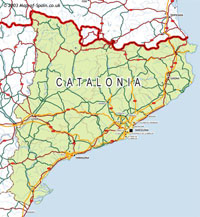Poll: Voters in Catalonia want to see region more autonomic
Supporters say the plan is not a step toward outright independence, but a matter of Spain acknowledging it is a patchwork of peoples - Catalans, Basques, Galicians, Valencians and others - with distinct cultures, languages and customs.

At stake is a much bigger slice of the tax revenue collected in Catalonia, more control over appointments of judges and prosecutors at courts run from Madrid, an indirect proclamation of Catalonia as a nation and control over everything from trains to work permits for immigrants.
The vote is binding and final. If the charter passes, it becomes law.
And lots of people will be watching. Chief among them are the Basques, boosted by a cease-fire from the separatist group ETA and seeking a redo of their own 30-year-old regional charter, which gives them a large degree of autonomy. They see Catalonia as a possible template, the AP reports.
Then there's the European Union, which likes member countries to shift power to regions as a way to ease fears of vanishing identity in a one-size-fits-all European superstate of 25 members.
A poll published May 30 in the Spanish newspaper El Mundo said 54 percent of Spaniards oppose the new Catalan charter and about the same proportion say it should be put to a national vote, not just in Catalonia.
Subscribe to Pravda.Ru Telegram channel, Facebook, RSS!



